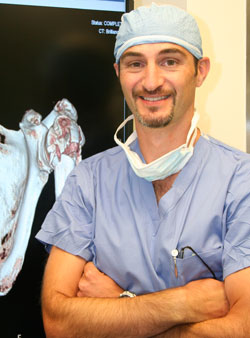Patient Selection for Bilateral Total Knee Replacement Needs Improvement
New York—October 1, 2012
Because there are more risks with having a total knee replacement in both legs at the same time than having a knee replacement in one leg, doctors in recent years have been selecting younger and healthier patients for the bilateral procedure. Now a new study by researchers at Hospital for Special Surgery has revealed that although patients are younger and healthier than those undergoing only one-sided surgery, they are becoming sicker and some complication rates have risen.
 “Although we are selecting younger people, we can’t ignore the fact that the population in general is getting sicker,” said Stavros Memtsoudis, M.D., Ph.D., director of Critical Care Services at Hospital for Special Surgery (HSS) in New York City, who led the study. “Many of the complications that we studied didn’t decrease over time as you would expect with younger patients and better health care, and some of the complications even increased.” The study is published online ahead of print in the journal Clinical Orthopaedics and Related Research.
“Although we are selecting younger people, we can’t ignore the fact that the population in general is getting sicker,” said Stavros Memtsoudis, M.D., Ph.D., director of Critical Care Services at Hospital for Special Surgery (HSS) in New York City, who led the study. “Many of the complications that we studied didn’t decrease over time as you would expect with younger patients and better health care, and some of the complications even increased.” The study is published online ahead of print in the journal Clinical Orthopaedics and Related Research.
Rising levels of obesity appear to be driving the complication rates, as well as the increase in the utilization of total knee replacements. Obesity puts extra stress on joints and bones and can cause premature osteoarthritis.
To conduct their research into trends regarding bilateral total knee replacements, researchers at HSS turned to the Nationwide Inpatient Survey, sponsored by the Agency for Healthcare Research and Quality (AHRQ). This is the largest inpatient database available in the United States that includes information on patients of all ages. It collects data from about 20% of all hospitalizations in the U.S. The study investigators identified 258,524 bilateral total knee replacements performed between 1999 and 2008. The number of annual bilateral procedures increased by 75%. In 1999, bilateral procedures accounted for 3.7% of all knee replacement operations and in 2008, they accounted for 6% of the operations.
The average age of patients undergoing bilateral knee replacement decreased by 2.5 years from 1999 to 2008. As the years marched on, patients presented with higher rates of comorbidities, including renal failure, neurologic disease, liver disease, diabetes, and chronic obstructive pulmonary disease. Obesity increased by 131% during the study period. The only comorbidity that decreased was congestive heart failure.
Over the time period studied, the researchers identified a 3% increase in pneumonia, a 6% increase in pulmonary embolism, and a 3% increase in nonmyocardial infarction cardiac complications.
“The take home message of this paper is that we are fighting an uphill battle, because people are getting sicker, despite us attempting to limit risk by choosing younger people to do these procedures in,” said Dr. Memtsoudis. “We have to start thinking of other interventions other than patient selection that we can implement in order to reduce these complications.”
On a positive note, the investigators also found that absolute in-hospital mortality rates decreased at an average rate of 10% per year. The researchers attribute this decrease to advances in medicine and increased use of telemetry and observation in the last 10 to 15 years. “With advances in medicine and monitoring, we have been able to counteract this extreme event of mortality. If you get a complication and it is not recognized, you may die from it,” said Dr. Memtsoudis. “If you observe people more thoroughly, you may not be able to prevent the complication, but you may be able to prevent a mortal event resulting from it.”
The researchers also identified a cost shifting landscape. Patients stayed in the hospital an average of five days after their procedure in 1999 and an average of four days in 2008, but the proportion of discharges to a home or customary residence without home health care decreased at an average rate of 5.5% per year.
“Before this study, we were under the assumption that patient complications were steadily decreasing after bilateral knee arthroplasty, because of better patient selection and improvements in medical care,” said Dr. Memtsoudis. “Now we understand that the picture is more complex. Patients being selected for the procedure may be getting younger, but they are not getting healthier and maybe that is why we don’t see a drastic drop in complications.”
About HSS | Hospital for Special Surgery
HSS is the world’s leading academic medical center focused on musculoskeletal health. At its core is Hospital for Special Surgery, nationally ranked No. 1 in orthopedics for 14 years in a row and No. 2 in rheumatology by U.S.News & World Report (2023-2024). Founded in 1863, the Hospital has one of the lowest infection rates in the country and was the first in New York State to receive Magnet Recognition for Excellence in Nursing Service from the American Nurses Credentialing Center four consecutive times. The global standard total knee replacement was developed at HSS in 1969. An affiliate of Weill Cornell Medical College, HSS has a main campus in New York City and facilities in New Jersey, Connecticut and in the Long Island and Westchester County regions of New York State. In addition, HSS opened a new facility in Florida in early 2020. In 2019, HSS provided care to 151,000 patients and performed more than 35,000 surgical procedures, and people from all 50 U.S. states and 89 countries travelled to receive care at HSS. In addition to patient care, HSS leads the field in research, innovation and education. The HSS Research Institute comprises 20 translational research laboratories, 33 scientists, 10 clinician-scientists, 55 clinical investigators and 245 scientific support staff that drive the HSS research enterprise in the musculoskeletal “ecosystem,” neurology, pain management and rheumatic diseases. The HSS Innovation Institute was formed in 2016 to realize the potential of new drugs, therapeutics and devices. The HSS Education Institute is the world’s leading provider of education on musculoskeletal health, with its online learning platform offering more than 300 courses to more than 30,000 medical professional members worldwide. Through HSS Global Ventures, the institution is collaborating with medical centers and other organizations to advance the quality and value of musculoskeletal care and to make world-class HSS care more widely accessible nationally and internationally.
Need Help Finding a Physician?
+1.877.606.1555
Media Contacts
- Tracy Hickenbottom
- Noelle Carnevale
212.606.1197
mediarelations@hss.edu

